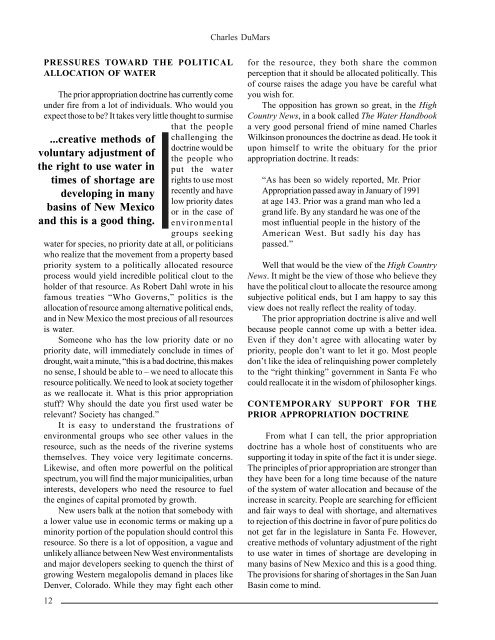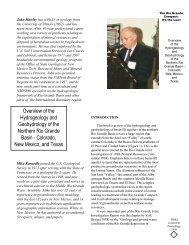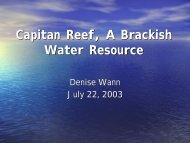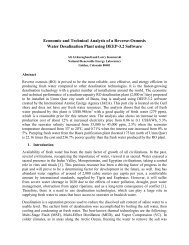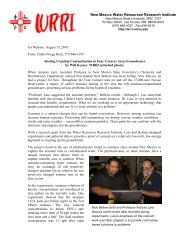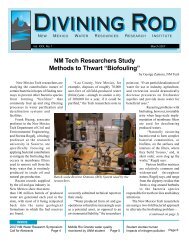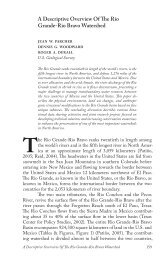Charles T. DuMars - Water Resources Research Institute
Charles T. DuMars - Water Resources Research Institute
Charles T. DuMars - Water Resources Research Institute
Create successful ePaper yourself
Turn your PDF publications into a flip-book with our unique Google optimized e-Paper software.
<strong>Charles</strong> <strong>DuMars</strong><br />
PRESSURES TOWARD THE POLITICAL<br />
ALLOCATION OF WATER<br />
The prior appropriation doctrine has currently come<br />
under fire from a lot of individuals. Who would you<br />
expect those to be It takes very little thought to surmise<br />
that the people<br />
...creative methods of<br />
voluntary adjustment of<br />
the right to use water in<br />
times of shortage are<br />
developing in many<br />
basins of New Mexico<br />
and this is a good thing.<br />
12<br />
challenging the<br />
doctrine would be<br />
the people who<br />
put the water<br />
rights to use most<br />
recently and have<br />
low priority dates<br />
or in the case of<br />
environmental<br />
groups seeking<br />
water for species, no priority date at all, or politicians<br />
who realize that the movement from a property based<br />
priority system to a politically allocated resource<br />
process would yield incredible political clout to the<br />
holder of that resource. As Robert Dahl wrote in his<br />
famous treaties “Who Governs,” politics is the<br />
allocation of resource among alternative political ends,<br />
and in New Mexico the most precious of all resources<br />
is water.<br />
Someone who has the low priority date or no<br />
priority date, will immediately conclude in times of<br />
drought, wait a minute, “this is a bad doctrine, this makes<br />
no sense, I should be able to – we need to allocate this<br />
resource politically. We need to look at society together<br />
as we reallocate it. What is this prior appropriation<br />
stuff Why should the date you first used water be<br />
relevant Society has changed.”<br />
It is easy to understand the frustrations of<br />
environmental groups who see other values in the<br />
resource, such as the needs of the riverine systems<br />
themselves. They voice very legitimate concerns.<br />
Likewise, and often more powerful on the political<br />
spectrum, you will find the major municipalities, urban<br />
interests, developers who need the resource to fuel<br />
the engines of capital promoted by growth.<br />
New users balk at the notion that somebody with<br />
a lower value use in economic terms or making up a<br />
minority portion of the population should control this<br />
resource. So there is a lot of opposition, a vague and<br />
unlikely alliance between New West environmentalists<br />
and major developers seeking to quench the thirst of<br />
growing Western megalopolis demand in places like<br />
Denver, Colorado. While they may fight each other<br />
for the resource, they both share the common<br />
perception that it should be allocated politically. This<br />
of course raises the adage you have be careful what<br />
you wish for.<br />
The opposition has grown so great, in the High<br />
Country News, in a book called The <strong>Water</strong> Handbook<br />
a very good personal friend of mine named <strong>Charles</strong><br />
Wilkinson pronounces the doctrine as dead. He took it<br />
upon himself to write the obituary for the prior<br />
appropriation doctrine. It reads:<br />
“As has been so widely reported, Mr. Prior<br />
Appropriation passed away in January of 1991<br />
at age 143. Prior was a grand man who led a<br />
grand life. By any standard he was one of the<br />
most influential people in the history of the<br />
American West. But sadly his day has<br />
passed.”<br />
Well that would be the view of the High Country<br />
News. It might be the view of those who believe they<br />
have the political clout to allocate the resource among<br />
subjective political ends, but I am happy to say this<br />
view does not really reflect the reality of today.<br />
The prior appropriation doctrine is alive and well<br />
because people cannot come up with a better idea.<br />
Even if they don’t agree with allocating water by<br />
priority, people don’t want to let it go. Most people<br />
don’t like the idea of relinquishing power completely<br />
to the “right thinking” government in Santa Fe who<br />
could reallocate it in the wisdom of philosopher kings.<br />
CONTEMPORARY SUPPORT FOR THE<br />
PRIOR APPROPRIATION DOCTRINE<br />
From what I can tell, the prior appropriation<br />
doctrine has a whole host of constituents who are<br />
supporting it today in spite of the fact it is under siege.<br />
The principles of prior appropriation are stronger than<br />
they have been for a long time because of the nature<br />
of the system of water allocation and because of the<br />
increase in scarcity. People are searching for efficient<br />
and fair ways to deal with shortage, and alternatives<br />
to rejection of this doctrine in favor of pure politics do<br />
not get far in the legislature in Santa Fe. However,<br />
creative methods of voluntary adjustment of the right<br />
to use water in times of shortage are developing in<br />
many basins of New Mexico and this is a good thing.<br />
The provisions for sharing of shortages in the San Juan<br />
Basin come to mind.


